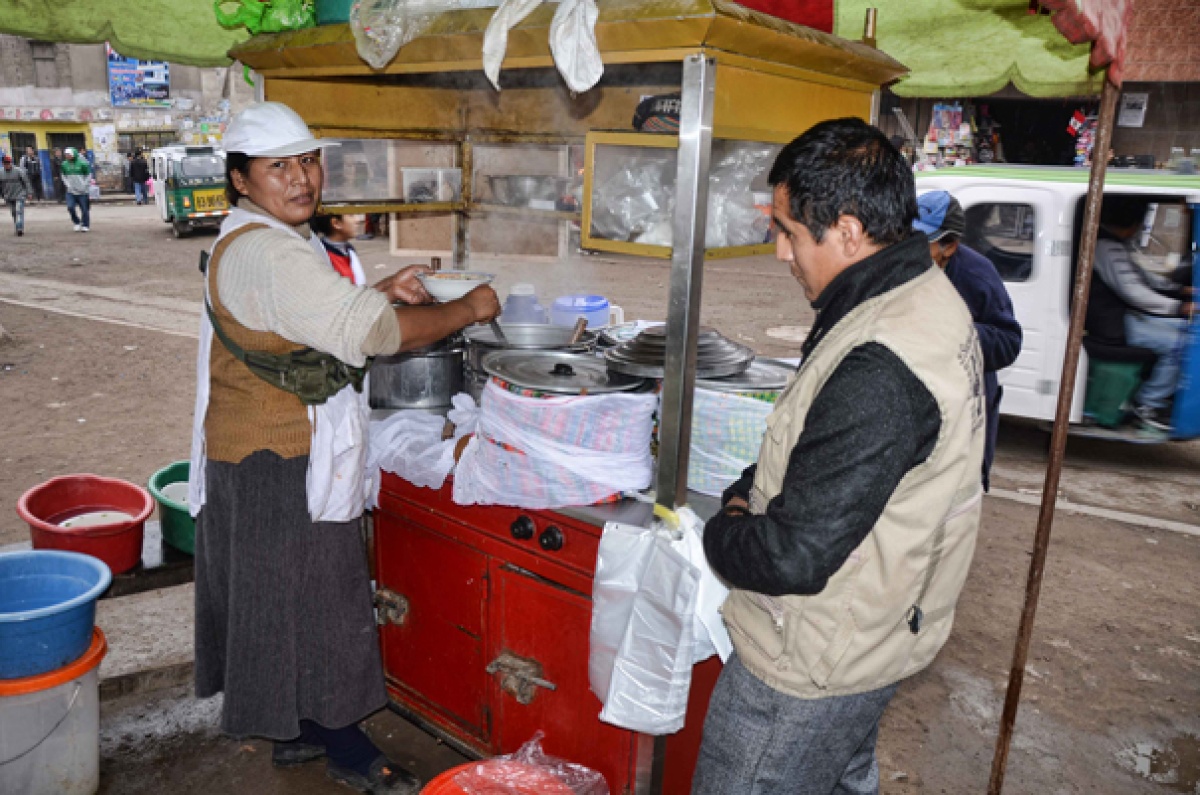Peru Program Helps Recovered Patients Find Work
Posted on Sep 18, 2013

When Marcela Mamani starts cooking at 4 a.m. each day, the streetlights still burn bright along the dirt roads of her Lima neighborhood.
She breaks eggs into a bowl and mixes them into a steaming vat of corn and chicken stew, which she sells on the street to chilly Peruvians hungry for a hot meal. Then, with a series of firm pats, she wakes up her three children, who sleep huddled together in a single bed.
Mamani, a survivor of multidrug-resistant tuberculosis (MDR-TB), earns about $30 a day with this small business she started with a microloan and training from Socios En Salud, Partners In Health’s sister organization in Peru (PIH/SES). The program helps recovered MDR-TB patients enter the workforce after two or more years of arduous treatment that leave many without jobs or support from friends and family.
“Socios En Salud gave me the opportunity to open my own business, and I had to make the most of it,” Mamani said. “With little experience but a lot of desire to get ahead, I became an entrepreneur.”
PIH/SES believes comprehensive health care for poor people must improve the social and economic conditions that often accompany disease. To that end, PIH/SES has worked to help 384 tuberculosis and HIV patients find employment since 2006.
Now I’m not afraid of getting out of bed. I know that there are good days and low days, but not bad days.
With a variety of partners, the program provides several ways for recovered patients to begin working: continuing education to find a skilled job, including nursing, accounting, welding, and cosmetology; counseling on job searching; and support to start small businesses, including microloans and training. PIH/SES has also worked to develop partnerships with government and private enterprises to help patients get hired after treatment.
A Dark Hole
Mamani earns a meager living, but it’s a big improvement from her situation just a few years before, when she became ill with MDR-TB.
“When the sickness started, I fell into a dark hole so deep that I was afraid to keep living,” said Mamani, whose husband abandoned her. “To get up every day was agony. I didn’t know how to tell my children that there wasn’t anything to eat. I was alone and sick.”
Mamani began treatment for MDR-TB that was provided by the Peruvian Ministry of Health, but the medicines made her sick and weak, and she couldn’t work. One day, after going two days “without touching a piece of food, ” Mamani’s neighbor told her she should give up her children to someone who could care for them. She couldn’t do it: “They are my children,” she said.
Just then, a community nurse from PIH/SES knocked on her door. She wanted to see how Mamani was faring with her MDR-TB treatment. She offered support designed to complement the clinical treatment she received, including visits from a community health worker, food, and psychosocial counseling.
“It’s not often that people help you with no interest in getting anything in return,” Mamani said. “I couldn’t believe it, but they always came with food and other things for me and my children.”
With clinical care and social support, Mamani completed treatment in 2011 and enrolled in the PIH/SES income generation program. Participants receive loans and training on how to operate a small business, including sessions on taxes, marketing, entrepreneurship, business management, and customer service. The average loan in the program is $775, with a monthly payment of $65. Mamani used the loan to buy the pots, pans, and plates she needed to cook.
"Now I’m not afraid of getting out of bed. I know that there are good days and low days, but not bad days,” she said.
The Fight Continues
PIH/SES has been fighting MDR-TB in Peru for more than 17 years, but our role has shifted dramatically as the Peruvian government has taken on treatment of the disease.
When Partners In Health discovered an epidemic of MDR-TB in 1995 in the shantytowns of Lima, the World Health Organization called for treating only TB that could be cured with standard, first-line drugs in poor countries—letting patients with MDR-TB die. “MDR-TB is too expensive to treat in poor countries,” one WHO document stated.
PIH/SES pioneered a strategy to cure patients and stop transmission of MDR-TB through accompaniment—daily visits by community health workers who deliver individualized treatment to patients in their homes. Research proved that cure rates among PIH’s MDR-TB patients in Peru rivaled rates at hospitals in the United States. With this documented success, PIH and our partners pressed for reduced drug prices and changes in global policies. In 2006, the WHO released new guidelines calling for universal access to treatment for MDR-TB.
The Peruvian government now provides treatment to all MDR-TB patients, and PIH/SES continues to support the most vulnerable patients with services that help them complete the taxing treatment. In 2012, more than 75 percent of PIH/SES patients were cured, as compared to a national MDR-TB cure rate of 39 percent in 2009, according to a 2013 article in The Lancet.

